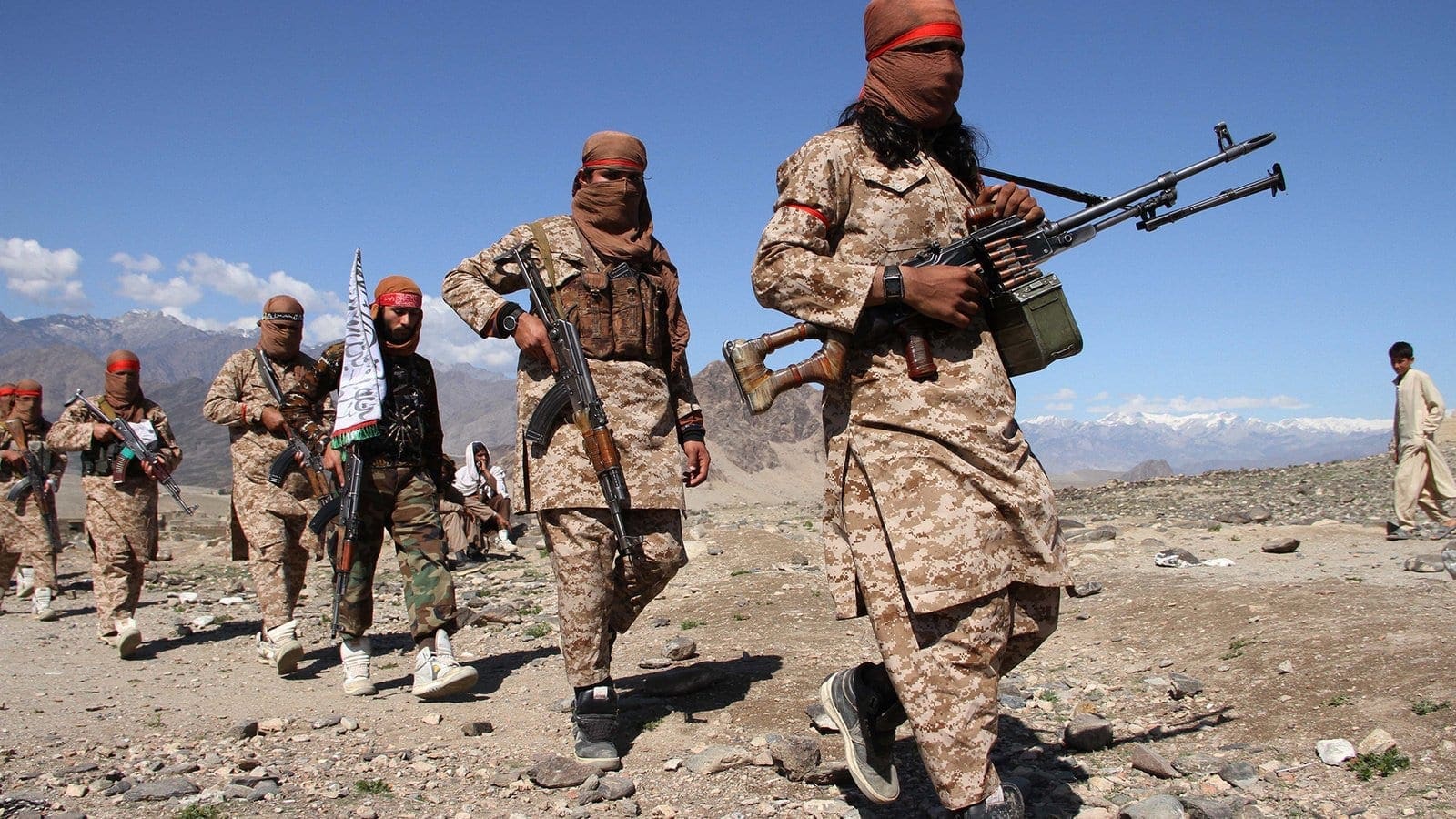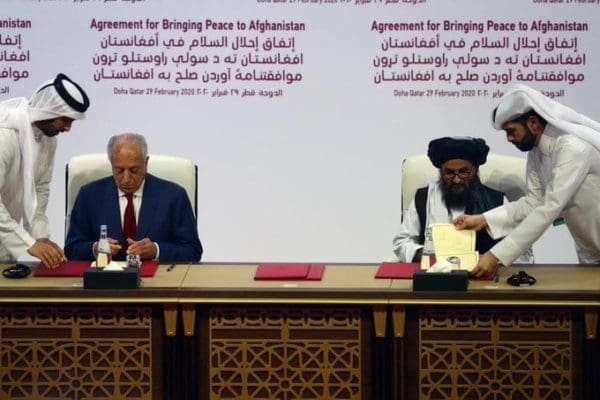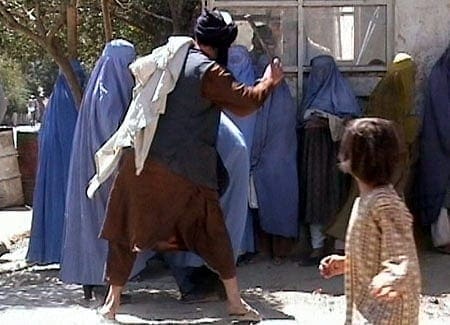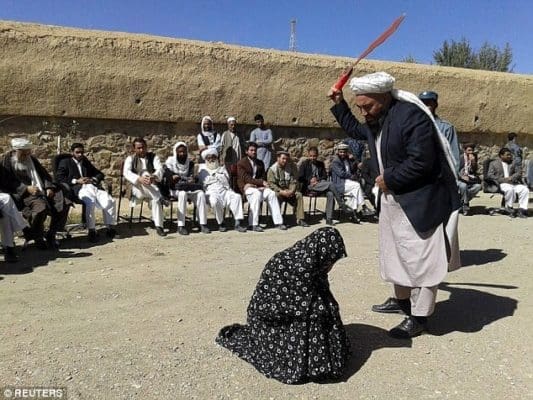
The Taliban an Introduction
The Taliban is an Islamic fundamentalist military organization with the most prominence / an active tendency to cause insurgency in Afghanistan. The Taliban had emerged initially in 1994 as one of the prominent factions of the Afghan Civil War. It primarily consisted of students from the Pashtun areas of eastern and southern Afghanistan. Most of the boys in this group were students of the traditional Islamic school and fought during the Societ Afghan War. Gradually, as they spread throughout Afghanistan, they started referring to themselves as the Islamic Emirate of Afghanistan.
They predominantly ruled Afghanistan from 1996 till 2001, when the US-led invasion toppled the regime for providing refuge to Al-Qaeda and Osama Bin Laden.
They are known for their harsh enforcement of the Islamic Sharia Law, which is derived from the religious precepts of Islam. It is the enforcement of the sharia law that resulted in the brutal treatment of many Afghan men but primarily women. Their ideology is said to be a combination of sharia law and the ideas of militant Islamism.
During their rule from 1996 to 2001, the Taliban and its allies committed several massacres in the city. They denied UN food supplies, thereby starving almost 160,000 civilians, and conducted a scorched earth policy, which meant destroying any item or resources that could prove helpful for the enemy. In addition, they banned hobbies and activities such as flying kites or keeping birds as pets and discriminated against religious and ethnic minorities.
They were responsible for cultural genocide in the country and were the reason behind the destruction of the famous 1500-year-old monument of the Buddhas of Bamiyan.
How Has The World Responded To The Taliban
The last two decades have seen continuous efforts by the government and the international bodies primarily led by the US to weed out the Taliban and change the Afghan government, their democratic institution, and how their civil society works. As a result, the US was successful in overthrowing the Islamist students that invaded Afghanistan in 2001. However, ever since then, the Taliban has led an insurgency against the US-backed Afghan government.
In early 2011, the US had placed around one thousand troops around Afghanistan. By early 2021, around 2500 US troops and 7000 additional troops from NATO members were stationed around Afghanistan.
The continuing war between the US and the Taliban for over 20 years has now made the UN security council take specific actions against the Taliban. In 1999 the UN security council imposed their first sanction on the Islamist regime in Afghanistan for harboring Al-Qaeda and expanded it after the 9/11 attack.
The UN has targeted the financial assets of the Taliban leaders and banned them from most of their travels. The Security Council also imposed an arms embargo on the Islamist government.
Multiple bans by the US and other countries tried to support the transition of Afghanistan. Countries assisted with grants which were sourced through government expenditures. In a conference held in 2020, the donor countries pledged over 3.3 billion dollars for the aid of Afghanistan.
The Taliban’s presence in the modern world can become a way to the disruption of peace.

In March 2020, a peace treaty was signed between the US and the Taliban in the hope of paving the way for the beginning of a peaceful world. This meant that the US would withdraw its foreign troops from Afghanistan, and on the other hand, the Taliban would break all its ties with Al-Qaeda. Thus, they would make way for peace not just with the United States but also within its nation.
Several countries around the world gave their reaction to this new development. India stated that its consistent policy has been to bring peace, security, and stability to Afghanistan. It is said to continue extending all support to Afghanistan as a contiguous neighbor. India believes that the interests of all the sections of Afghan society should be protected. Therefore any hand towards the end of terrorism and betterment of the situation in Afghanistan must be supported.
Pakistan maintained that it would continue to support a peaceful, stable, and united Afghanistan, which has peace with itself and its neighbors. The North Atlantic Treaty Organization (NATO) stated that this peace deal had provided an opportunity to reduce violence and opened a way for the Afghan government and the Islamist movement to have a peace agreement within themselves as well.
Antonio Guterres, the UN Security General, described the agreement as an important development in achieving a political settlement in Afghanistan and helping in reducing violence worldwide. However, the Afghan president, Ashraf Ghani, said that ultimately it depends on the Taliban’s commitment to the peace deal.
While the world was giving its opinions on forming the new treaty, Afghan citizens had a very emotional response. Some of the interviews went like this:
Esmat, 24, Helmand province
“I lost a leg in the clashes between the Taliban and security forces. My father was a tribal elder, and six years ago, when he was traveling with my 10-year-old brother, the Taliban attacked them. Both of them were killed. I listen to the radio every day to find out how far the peace talks have progressed. I support this process and pray daily that the war will end and that peace comes to my country. I really hate the war.”
Zarmina, 27, Tehsang, Ghazni province
“It was midnight when clashes between the Taliban and security forces began. I didn’t know if it was a bomb or a rocket that hit my house. My husband and three daughters were killed. I saw my husband’s head blown off. Two of my daughters are alive, but all of us suffer from mental problems now. Yes, I am optimistic about peace talks. … I do not know if peace will be achieved, but it is enough to just end the war.”
Future Of Women Under The Taliban Of The Modern World
The peace treaty signed between the US and the Taliban has been a moment of both hope and fear. The women have been the victims of the deep-seated misogynistic thoughts of the Taliban for over forty years. Even Though they have fought for equality after the fall of the Islamist government, they desperately long for peace. Afghan women’s rights activists have faced a lot of resistance from the Afghan government. The lack of international support and the Taliban’s relentless discrimination against women and girls have increased the fear amongst women.

The US-Taliban deal focused on the withdrawal of foreign troops to prevent international terrorism. However, women’s rights were not included in any of these. Zalmay Khalilzad, the lead US envoy, said that women’s rights and other questions related to human rights and political structures would be resolved only after the intra-afghan talk. Although the intra-afghan discussion started in September 2020, the representation of women was meager.
With only five Afghan women representatives from the Afghan government’s side and none from the Taliban regime’s side, the future of women in Afghanistan is still uncertain.
Many Afghan women have a lot to lose if the intra-afghan treaty goes bad. During the Islamist rule in the 1990s, there were not only brutal social restrictions on women, such as the mandatory wearing of the burqa, there were also restrictions to healthcare, education, and jobs. In addition, the regime destroyed the Afghan institution and the economy, which critically affected women and children. But the post-Taliban constitution gave Afghan women all kinds of rights, which they were deprived of.
The government constructed around 3000 health facilities by 2018. The number of girls enrolled in schools and universities also increased by 33 percent by 2017. By 2021 around 21 percent of Afghan civil servants were women.
This slight improvement in the situation for women was uneven throughout the country. Many rural women, most of them residing in the Pashtun area were fully dependent on men in their families for even the basic necessities of their lives. These were also the places where the Islamist regime still prevailed. Men in these families lived with an orthodox mentality and wanted their women to stay within the confined places. In these areas, the laws are as strict as they were back in the 1990s. So what could have been done?
The position of Afghan women towards peace varied across places. Educated women rejected the possibility of another Taliban regime. They wanted a peaceful deal where the power of the fundamentalists is minimum. However, the rural women could not have the ideology of a similar kind; they are the ones who are worst affected by fights between the Taliban and the Afghan government. They have already lost a lot of men in their families. For them, more loss of members will psychologically traumatize them and leave them with no livelihood.
Due to their current situation, and their need to save their families, they have no option but to support the Taliban regime. In Fact, many rural women have pointed out that the Taliban also reduced sexual predation and robberies that weakened their lives, thereby surrendering themselves to their rule.

Looking at the state of women, the question that now comes to the table is that what exactly does the Taliban have to say about women’s rights in today’s time. To be honest, there is no realistic prospect of the defeat of the Taliban in the hands of the Afghan government.
The Taliban could not be defeated militarily. The only option that remains is peaceful negotiation. There is a possibility that the Taliban would become a dominant power in the future of the Afghan government.
The Taliban already has some power in significant parts of the country and is a part of the negotiation it makes with the local communities there, thereby shaping Afghan women’s rights. Several Taliban interlocutors have stated in an interview that they do not wish to return to the behaviors of the 1990s. They firmly say that the Taliban wants to protect women’s rights under sharia; however, it will still cover a range of policies.
Even Though the Taliban has said that they want to “protect” women’s rights under sharia, they still haven’t specified how this protection will occur. But looking at the events from the past, the Taliban’s inclination will further weaken women’s rights. With more cultural restrictions on women and shrinking their socio-economic opportunities. Some Taliban interlocutors also suggested that women can hold ministerial positions in future Afghanistan but can never be the head of state or government.
What The Future Of Taliban Looks Like In The Modern World
Taliban’s effect in the modern world still consists of the same old brutality. Even after so many years, parts of the country still witness those harsh punishments such as whipping women for sex outside marriage, stoning them to death for certain offenses, and punishing them for not wearing a burqa. However, in other parts, the Taliban have become more permissive than ever. Older males in some communities often approached the Taliban and demanded that they enforce more traditional and severe restrictions on women’s rights.
While women’s rights are still in question under the Taliban’s rule, they have stopped shutting down primary schools. Rather they now send representatives to the schools to ensure that the schools do not teach anything that the Sharia disapproves of. This censorship of education is problematic, but basic literacy is preferable to none. In addition, they are no longer prohibiting government clinics, electricity, and government services.
Even with these small moderations in the behavior of the Taliban in today’s time, it is possible that they would restrict women’s rights even more, thereby weakening their condition. Modern times have brought certain changes but today’s effect is not up to the mark.
The world has been affected by the Taliban. However, the extent to which Afghanistan has been affected cannot be compared to any other part. The US-Taliban treaty that was signed in 2020 was halted due to the intra-afghan talk, which did not commence until September 2021.
The United States has committed to withdrawing all the US and NATO security troops from Afghanistan if the Taliban carries out their commitments. The delay in the intra-afghan talks could kill the peace process as a lot is at stake. The Taliban believes in military victory and now identifies itself as a unique jihad group, who successfully defeated the United States to negotiate an exit.
In the modern world today, the Taliban wants to establish an Islamic government in Afghanistan, led by a religious leader and drawing legitimacy from the clerics. It is improbable to be sure what they would want to seek from the intra-afghan talks. If their motive was just to remove the US troops from the Afghanistan border so that they can form a new reign of control all over again, then it can become a problem not only for the peace of Afghanistan but for the entire world.
Just like what Bill Roggio, an editor, said, “for Taliban peace doesn’t mean an end to the fighting, it means an end to the US occupation.” After so many changes, the effects of the Taliban on the modern world only become clear with time. Till then, the world has to wait.

About the Author: Devaanshi is a humanities student with an absolute love for traveling and everything related to it. Cooking and Writing are other fields that interest her.

Be the first to comment